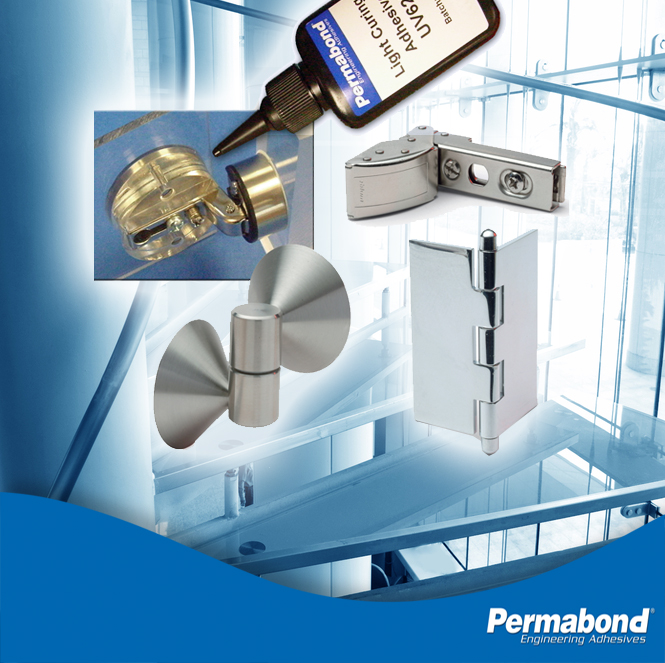Permabond manufactures many types of glass adhesives. The following highlights the features and benefits of each type.
Permabond UV glues form high strength bonds, which are suitable for decorative and structural glass bonding applications. They are excellent for bonding glass to glass or glass to metal. UV adhesives form very high strength bonds for load-bearing joints, such as those found in glass furniture, architectural features (such as glass staircases and balustrades), and display cases. Flexible and stress-absorbing, Permabond UV glues are available for use in applications that require substrates with different thermal expansions to be bonded. Their high optical clarity and resistance to yellowing make them very popular for “invisible joints”.
In most cases, our industrial customers want a tack free, fast curing UV glue. Permabond has a variety of optically clear, non-yellowing products which vary in viscosity and flexibility to suit every glass adhesive need. Some of our specialty glass customers prefer a staged cure product such that they can bond beveled glass and still have the ability to clean the exposed surface easily – Permabond manufactures specialty glass glue for these applications.
Both one and two component epoxy bond glass, using Permabond 2K primer aids adhesion and long-term durability. However, for a non-yellowing bond, UV-curing adhesive is normally a better option
Structural acrylic glass adhesives bond glass to glass as well as to plastic and metal. They are often preferred for bonding hinges and fitting to the heavy, structural glass found in turnstiles or railings. Benefits include:
They also absorb differential expansion and contraction stresses between dissimilar surfaces. This helps to reduce the chance of glass cracking from thermal shock.
Due to the basic nature of glass, cyanoacrylate adhesives cure very rapidly on glass and appear to have a strong bond. However, the accelerated cure creates stresses in and around the bond which makes the cured adhesive prone to degrade over time. These stresses, the brittle nature of cyanoacrylate adhesive, and the significant difference in the coefficients of thermal expansion between the glass and the adhesive can contribute to bond failure. To improve results, test a rubber toughened cyanoacrylate such as Permabond 731 but be mindful that the bond will not be permanent. In summary, cyanoacrylate adhesives are not the best glue for glass.
Permabond MS359 Clear a single-part, room temperature curing MS polymer glass adhesive. It is ideal for use on a wide variety of substrate materials, including metals, glass, and composites. MS359 Clear is perfect for exterior construction applications as it has excellent resistance to weathering, is non-yellowing, and produces a discreet, aesthetically pleasing bond.
Still unsure which is the best glue for glass for your application? Contact Permabond Technical Support for a product recommendation. Or see information about which industries use Permabond Glass Glue.
